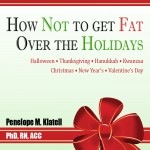Doesn’t it feel like you gain at least seven pounds of weight, all of it blubber? A lot of us start indulging at Thanksgiving (some at Halloween) and don’t stop the free style calorie fest until those onerous New Year’s Resolutions. Then, because we feel guilty about indulgences, we swear we won’t touch another cookie or piece of cake or candy until we lose massive amounts of weight. And then comes Valentine’s Day.
Some Facts
A study of holiday related weight gain published in The New England Journal of Medicine found that the average weight gain between Thanksgiving and New Year is slightly less than a pound.
The problem is that most of us don’t lose that extra pound that attaches itself in unwanted places and accumulates year after year. And, although the average holiday gain is only one pound, people who are already overweight tend to gain a lot more – one study found five or more pounds during the holidays.
Something To Think About
You need to eat 3,500 extra calories to gain a pound. According to the Calorie Control Council, Americans may eat more than 4,500 calories and – oh my gosh — 229 grams of fat from a combination of snacks and a traditional “turkey with all the trimmings” holiday dinner. And, that doesn’t include breakfast or leftovers!
All together, that’s more than twice times the average daily calorie intake and almost three and a half times the fat since 45 percent of the calories in the typical holiday dinner can come from fat. A scary fact: the average person may eat the equivalent of three sticks of butter during a holiday meal.
The average holiday dinner alone carries a load of 3,000 calories with many of us nibbling and noshing our way through another 1,500 calories of chips, dips and drinks and the like before and after the big meal. According to the chief exercise physiologist for the American Council on Exercise (ACE), a person who weighs 160 pounds would have to run at a moderate pace for four hours, swim for five hours, or walk 30 miles to burn off a 3,000-calorie meal. That’s a whole lot of exercise!
Where Do Extra Holiday Calories Come From?
Most extra holiday calories don’t come from the “day of” holiday meal but from unrelenting nibbling during the holiday season. It’s way too easy to add on 500 extra calories a day — which translates into a pound in a week (7 x 500 = 3500 calories, or 1 pound).
Here are some common holiday indulgences that weigh in at around 500 calories:
- 12 ounces of eggnog
- 1 piece of pecan pie
- 3 ounces of mixed nuts
- 22.5 Hershey’s Kisses
- Starbucks’ Venti Peppermint Mocha with whipped cream
- 4 glasses (5oz.) of wine
- 10 regular size candy canes
- 2-3 large Christmas cookies
- 2.5 potato latkes
- 4 fun-sized Snickers and 20 pieces of candy corn
What To Ask Yourself Before A Holiday Indulgence
— or for that matter, before indulgences any time of the year:
- Do I really, really want it or is it because it looks good, smells good, or just means Christmas (or Halloween, or thanksgiving, or Hanukkah, or Valentine’s Day?
- Is it worth the calories?
- Do I need all of it (or any of it) to be happy or satisfied?
- How will I feel after I eat it – both physically and emotionally?
- What is important to me: the food, how I feel while I’m eating it, how I feel after I eat it, what the scale might say to me tomorrow morning?
Once you’ve had the conversation with yourself eat whatever is yanking your chain and love it — or be pleased with yourself that you didn’t. Either way, you’ve made a mindful decision.
For more holiday eating strategies check out my soon to be released ebook: How Not To Get Fat Over The Holidays. I’ll let you know when it’s available from Amazon, Sony Reader, Nook, and iBooks.


